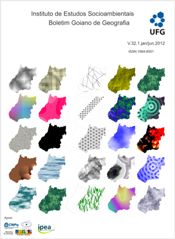O ESPAÇO, O TEMPO E A (DES)CONSTRUÇÃO DE UMA REALIDADE INTEGRADA - DOI 10.5216/bgg.v32i1.18956
DOI:
https://doi.org/10.5216/bgg.v32i1.18956Resumo
A Geografia tem subsidiado o diálogo do homem com o mundo desde a antiguidade clássica. Investigaçõescentradas nas relações travadas entre a unidade e a diversidade, reveladas pelo mundo, estão entre os temasclássicos deste saber transformado em ciência moderna. Ciência moderna consolidada no bojo de revoluçõesburguesas que garantiram o triunfo da razão humana sobre os mitos e as crenças que, por séculos, condenaramo homem a uma condição de servidão. Para tanto, houve uma série de especializações científicas para atenderas demandas de uma burguesia carente dos conhecimentos imprescindíveis à dominação da natureza, bem coma transformação desta em mercadorias. Neste movimento de adequação da realidade percebida às demandasprodutivas, o tempo e o espaço foram decantados e classificados de acordo com virtudes e defeitos a elesatribuídos previamente. O espaço foi classificado como imobilizador das dinâmicas sociais. Esta categoriade análise foi vinculada aos estudos privilegiadores de perspectivas lineares, enquanto o tempo assumiu acondição de mediador conceitual nos estudos em que a contradição se fazia presente. Para romper com estaperspectiva equivocada, o espaço está sendo reinserido nas teorias sociais críticas, com o intuito de superar asreduções desta separação arbitrária.Downloads
Não há dados estatísticos.
Downloads
Publicado
2012-06-15
Como Citar
DE MELLO, Marcelo. O ESPAÇO, O TEMPO E A (DES)CONSTRUÇÃO DE UMA REALIDADE INTEGRADA - DOI 10.5216/bgg.v32i1.18956. Boletim Goiano de Geografia, Goiânia, v. 32, n. 1, p. 59–71, 2012. DOI: 10.5216/bgg.v32i1.18956. Disponível em: https://revistas.ufg.br/bgg/article/view/18956. Acesso em: 10 fev. 2026.
Edição
Seção
Artigos











